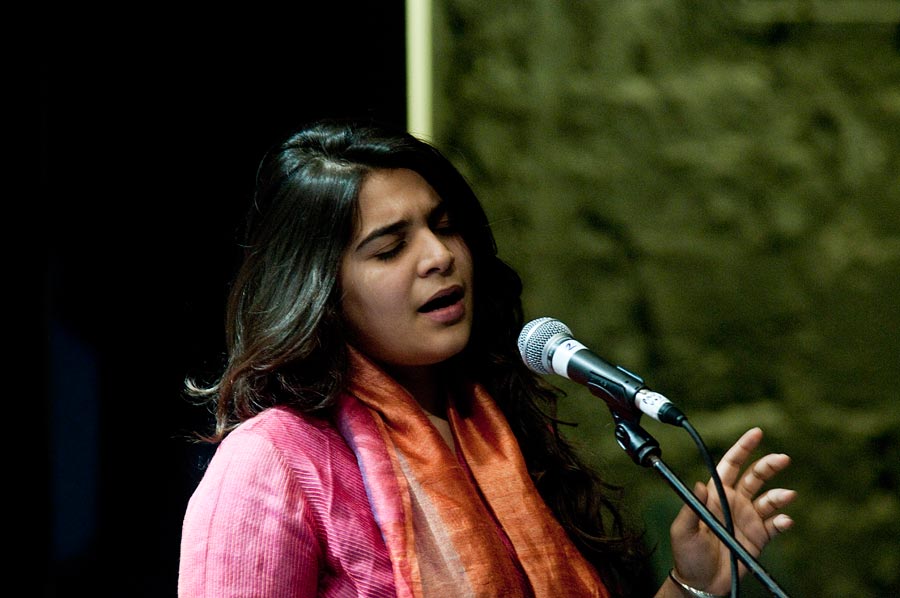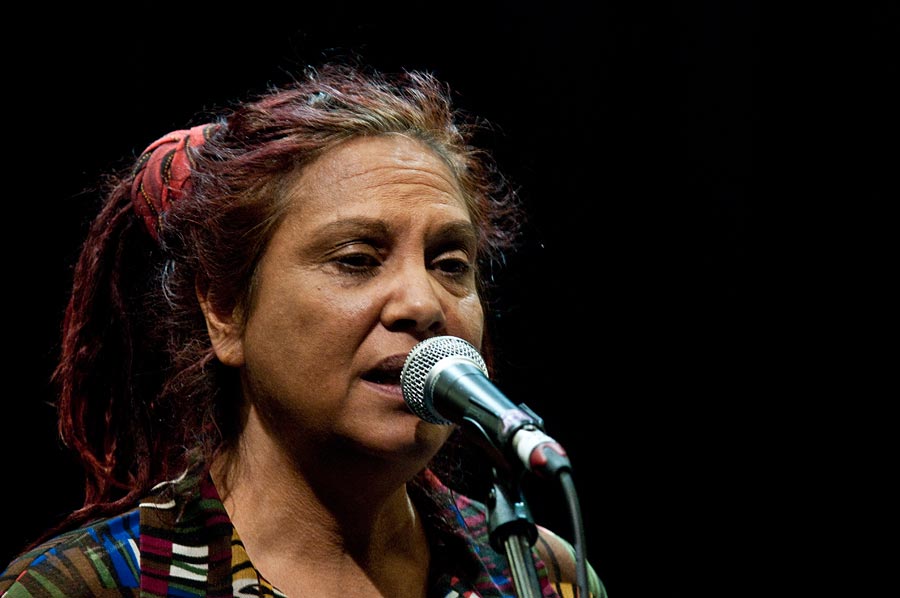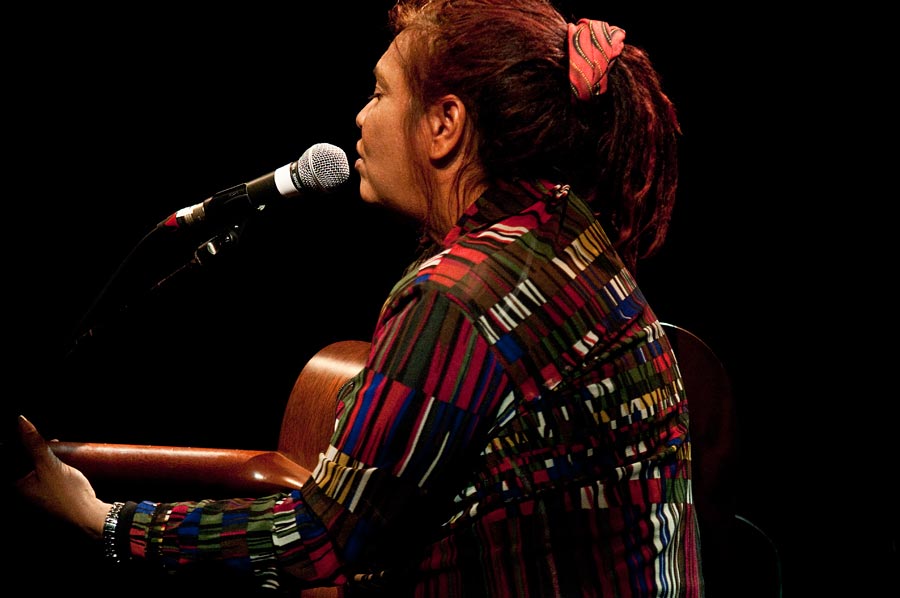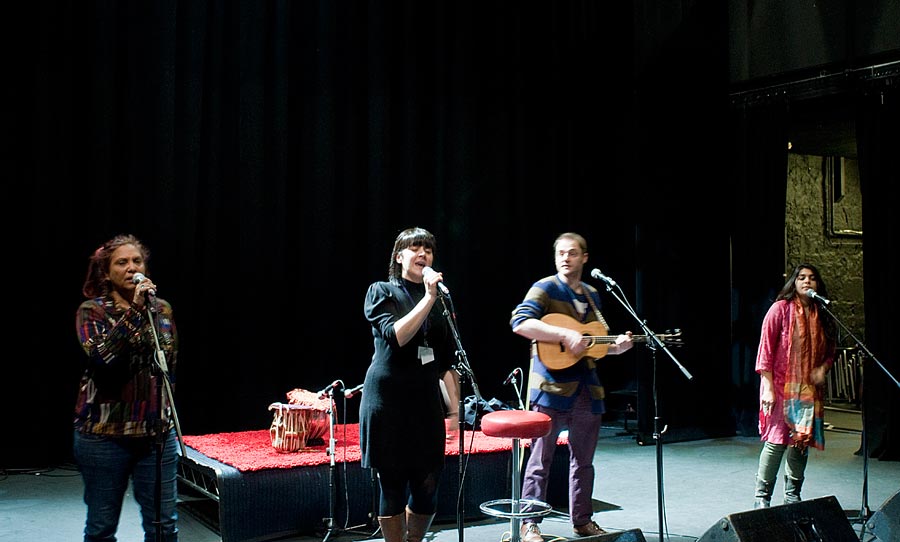
Shellie Morris, Fiona Hunter, Mike Vass and Parveen Sabrina Khan rehearse Auld Lang Syne before the Women of the World concert, Celtic Connections festival, January 25, 2014, Glasgow, Scotland.
The auditorium is empty, save for the lighting and sound man, the stage manager, a husband and a reporter.
On stage are three women from around the world, having met for the first time just a few minutes earlier. They will be performing individually in a couple of hours but need to prepare for an encore together.
In the midst of the women, musician Mike Vass1 suggests, because the concert falls on Burns Night, something suitable such as Auld Lang Syne2, as he contributes the chords on the guitar in the background. It may be common and well known to Glaswegian singer-cellist Fiona Hunter,3 but in the original Scots, it is unknown to fellow performers Shellie Morris,4 a ground-breaking Aborigine artist from Australia, and Parveen Sabrina Khan5, from Rajasthan, India.
Fiona and Mike demonstrate Auld Lang Syne as Parveen stares into the air to her left, and Shellie looks deep in thought at the floor to her right, both listening to sense where their own traditions merge together. They each try a verse, not so much constructing lines with words as splashing Indian and Australian colours on to Scots.
It is time for a full run through and the layers of sound pile on, filling the empty space. In less than 15 minutes, the artists have riffed a new and original version of a song written in 1788.
“I had not met either of the two women – we didn’t have a clue how it would work,” says Fiona just before her set later in the evening. “It was pretty amazing. I got a bit goosebumpy.”
“The song resembles a Raga I know,” says Parveen. “It’s funny how countries have common roots – music is so similar all over the world.
“It’s so nice to have women that are completely different and you learn to produce different music. It was an honour.”
The Women of the World concert6 was part of the 21st annual Celtic Connections7 festival in Glasgow, Scotland. Very different storytelling traditions were brought together from Commonwealth countries, two days past the six-months mark to the city hosting the Commonwealth Games.
But what the performance lacked in world-record speed – at more than two and a half hours – it made up for with record-worthy energy.
Shellie Morris’s latest album8 is a first of its kind in Australia. Opting to perform in Glasgow instead of attending a ceremony the same day back home as the Northern Territory nominee for “Australian of the Year”, she explains – almost justifies in the interview and later to the audience – that she has Scottish ancestry, as a Muir. It is her background as an indigenous performer and her rediscovery of her people, that has put her on the musical and cultural map.
Across that map are songlines, the music and stories that are so central to indigenous connection to the land, says Shellie9.
“I feel rooted to a people, but those people are from a particular place,” she says.
Throughout her set during the concert, Shellie describes how she was adopted at 12 weeks old, raised by loving non-Aborigine parents in Sydney, and then later connected to her family in the Northern Territory. Perched on a red leather stool, feet on the foot rest and gently plucking the guitar as she talks, then sings, in celebration of her early life.
“You picked me up and made me feel tall,” she sings, commanding the stage and the packed audience in front of her.
Shellie moves to sharing the journey to find her indigenous origins – punctuated with, “Excuse me, I have to burp” – and discovering her sister Mandy, singing in one of her 14-18 indigenous languages and then English.
“There has been a change,” explains Shellie before the show. “I don’t think I had a sense of place. Something changed in me, a strength I had never felt before in my life.
“I think there’s a freedom, and a sense of place.
“Our stories can be told in a different way. Our traditional songs are still there, but there’s an embellishment.”
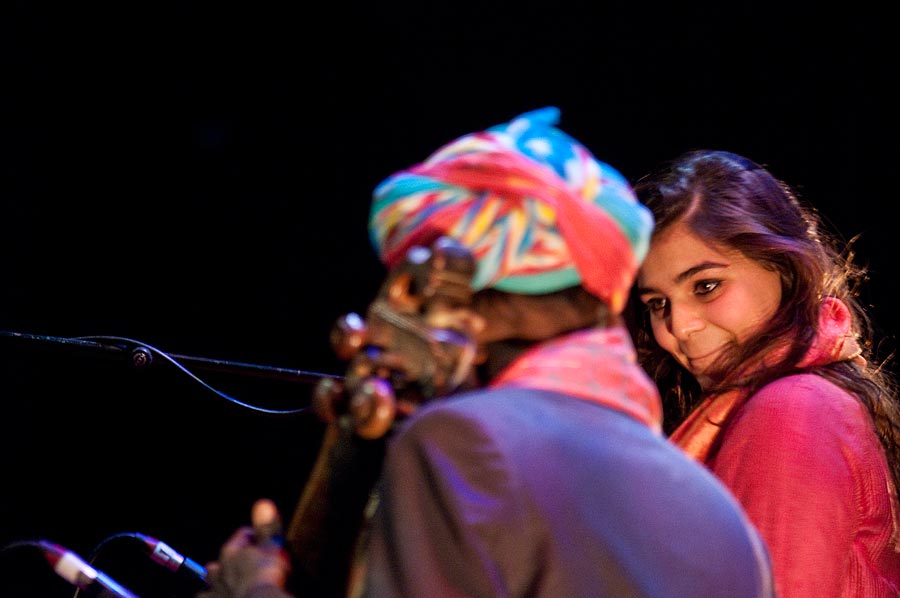
Parveen Sabrina Khan performs at the Women of the World concert, Celtic Connections festival, January 25, 2014.
Parveen is second to take the stage in the concert, seated on a red-carpet-topped platform with her father, Hameed Khan, to her right and Chanderji to her left, one of “four or five” people who can still play the distinctive Khamancha instrument.
The stage manager points out the small box Parveen asked to plug in just before she went on, something she hadn’t had during the sound check. It has a Continental plug, not a British one, and the stage manager says he put it upside down to keep it working during her set.
It is a suitable weekend for Women of the World, with January 25 marking Robert Burns’ birth, and January 26 being both Australia Day and Republic Day in India.
The 21st Celtic Connections features Parveen, who turned 21 just days earlier – a fact the audience is unaware of. Her voice carries more wisdom, celebrating the traditional and rare maenads of Rajasthan, a form of folk singing that is dying as much as dozens of indigenous languages in Australia.
Shellie is back stage in her black puff jacket and green and gold Wallabies scarf as Parveen’s shadow is caught by the black stage curtains to her side, her hands painting the air. Raga, one of which she heard in Auld Lang Syne, means colour or hue.
Each piece is appropriate to a particular time of day, except for the last, and each demonstrates a considerable vocal range, captivating the audience who applaud enthusiastically.
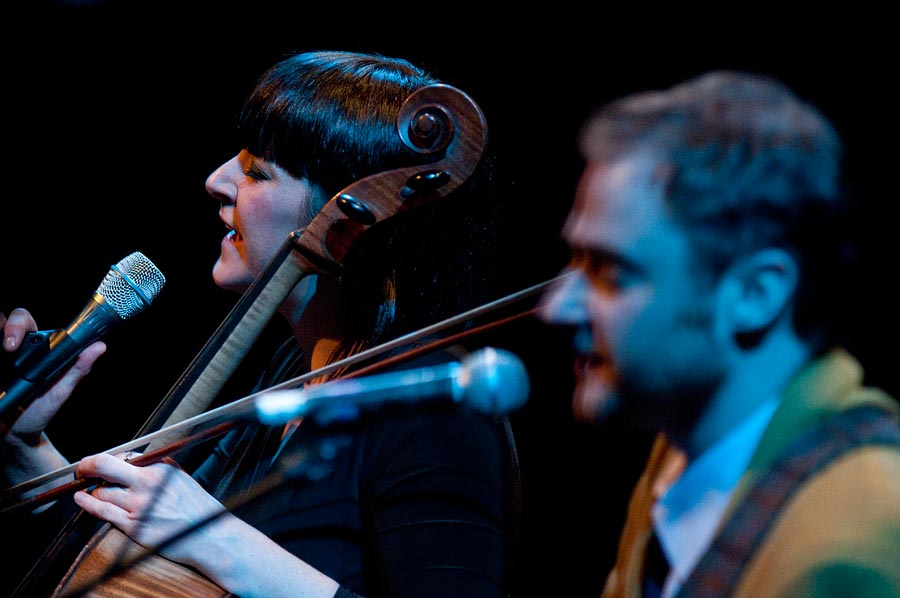
Fiona Hunter and Mike Vass perform at the Women of the World concert, Celtic Connections festival, January 25, 2014.
After the intermission, when Fiona and Mike walk on to the stage, they continue the storytelling of the concert. The ballads they sing celebrate the working of the mills in nearby Paisley, the mournful loss of young girls and travelling sailors, adventure and love.
Even as much as the women’s voices soar up into the void above the audience at the Tron Theatre in Glasgow, all the music is rooted in place. Local traditions can go global through technology and festivals and through the individual passions of the women working to share the music.
Shellie describes how the women of the Northern Territory love to tell stories, “the stories will always be there”.
Her husband, Jone Vuqa, says he “nearly fell over” when he first heard Shellie’s music written around the traditional songlines.
“All the stories of the land,” she sings in her final track during her set, with the audience repeating the refrain, “With our lands to this land”.
But even words and lyrics and music cannot fully capture the power.
“They have a power that I can’t even explain,” she says. “There’s no words to explain how powerful it is, and grounding.”
- http://mikevass.com/ ↩
- http://digital.nls.uk/robert-burns/ ↩
- http://fionahunter.co.uk/ ↩
- http://www.shelliemorris.net/ ↩
- http://parveensabrinakhan.wordpress.com/ ↩
- Concert listing ↩
- http://www.celticconnections.com/ ↩
- Ngambala Wiji li-Wunungu – Together We Are Strong, Shellie Morris and the Borroloola Songwomen, 2012 ↩
- http://songpeoples.tumblr.com/ ↩

